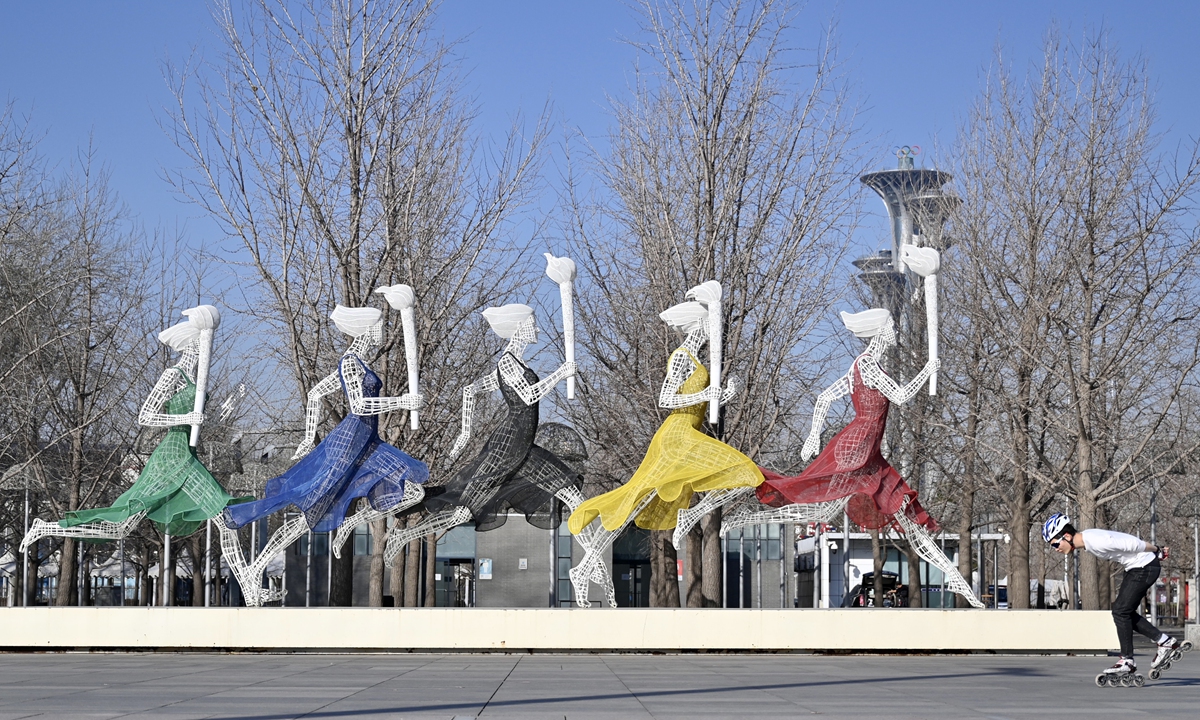Beijing beefs up health monitoring of people entering the capital as Winter Olympics near

A roller skater passes a sculpture at the Olympic Green in Beijing on November 24, 2021. The central section of the park will be closed to visitors from November 25, 2021 to March, 20, 2022 as it will host the 2022 Winter Olympics and Paralympic Games. Photo: VCG
Beijing has beefed up health monitoring of everyone entering to the capital to ensure that no one is missed as the capital tries to prevent a COVID-19 outbreak as Winter Olympics approaches. Now the capital city is facing threats posed by both Omicron and Delta, as well as imported cases.
Beijing will spare no effort in implementing epidemic prevention and control measures to ensure the security of the capital, Olympics and residents, Cai Qi, the Party chief of Beijing and anti-epidemic command center, said during a specialized meeting on Wednesday.
The municipal government is aware of the huge risks that can be brought by overseas cases, domestic clustered outbreaks and Omicron. The government has urged officials to stay alert on epidemic prevention and control measures as the Olympics are close at hand.
Multiple regions including Central China's Henan, Northwest China's Shaanxi, North China's Tianjin and South China's Guangdong are battling epidemic resurgences.
Tianjin is the first city on the Chinese mainland to engage in a battle against Omicron as of Wednesday, the total confirmed cases have reached 126. Besides, the Omicron variant has spilled over to Henan and Liaoning provinces from Tianjin. Data showed about 90 percent of some 345,000 students and teachers who had departed Tianjin since December 23, 2021 were screened out, highlighting the risk of spill-over cases still exists.
Meanwhile, Henan is battling both the Delta and Omicron variants. In 13 days, the total confirmed cases in the province have reached 585 as of Wednesday. Anyang, a city in Henan, has registered two Omicron cases which all can be traced to the Tianjin outbreak. But sources of the origins of outbreaks in other cities of Henan remain unclear.
All people coming or returning to Beijing will be monitored and screened. Any person who is deemed a risk will be quarantined to keep out any potential cases, Beijing municipal government said.
Those with travel history to medium-risk regions within 14 days should strictly follow epidemic rules. They're required to quarantine at home and take a nucleic acid test.
Commuters between Beijing and neighboring cities are encouraged to work from home to lower the flow of personnel. Public transportation to regions where COVID-19 cases have been detected will be suspended immediately.
To prevent secretive viral transmission within the city, Beijing will also escalate the normalized risk screen, this includes testing those working in key industries.
The anti-epidemic command center suggested residents to stay put during the upcoming Spring Festival holidays to reduce travel flow.
Global Times


